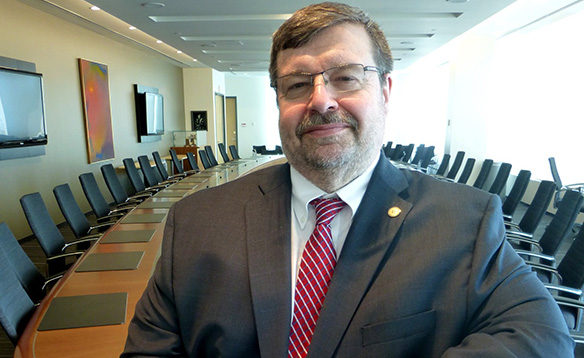By Shanleigh Brosseau, Editor-in-chief
Dr. Robert Haché, Laurentian University’s 11th President and Vice-Chancellor, sat down for an interview with Lambda where he talked about his plans to lead the university, meet the community and build connections with students.
Haché says the university’s potential is what lead him into the role, and is what has him most excited about being at Laurentian.
Before making his way to Sudbury, Haché was vice-president of Research and Innovation at York University. Before that, he was associate VP of Research at the University of Calgary, and vice-dean of Research for the Faculty of Medicine at the University of Ottawa.
“I was at a stage in my career where it was time to look for a new challenge, a new opportunity,” he said. “This was a natural step for me based on where I was and what I was doing.”
Having worked at and studied at multiple Universities across Canada, Haché says he is impressed by the commitment of the University’s community, something he says he has not seen other places that he’s been.
“Everybody’s here because they want to be, everybody’s making a choice to be here,” he said.
“I think [that] really underscores the potential of the institution. Where it’s not just a university with students, faculty, and staff, it’s a community. And that’s something that is a big advantage for the university.”
‘I was a number in the system’
Haché completed his Bachelor of Science degree in Biochemistry at McGill University, a place he felt didn’t have the personal touch Laurentian offers.
“I was a number in the system,” Haché said. “[After McGill] I went to Queens as a graduate student where I became a person again.”
He then went on to complete a Ph.D. in Biochemistry at Queen’s University.
“My first lecture on my first day [at Queens] had 800 students,” he said. “I was really intrigued by what I was learning. But overall, it was an impersonal experience.”
“That is the contrast of the experience that we have at Laurentian, where people get to meet the professors in the first year,“ he said. “I have yet to see an auditorium that holds a third of 800 people in a lecture for first-year students,” he said. “I think that’s a much more welcoming environment for students.”
As for his studies, Haché said he was drawn to molecular and cellular biology.
His interest in the field began in the mid-1970s after molecular cloning had started, which lead to his career and education in biochemistry and gene expression.
“I remember a summer where they had these congressional hearings, debating whether [anything] should be done using recombinant DNA,” he said. “I was just barely in high school at the time, but it struck me as being a fascinating field.”
Coming to Laurentian with an extensive background in research, Haché says he is open to opportunities to expand research initiatives at the University.
“The most important goal is to make the university a really interesting place for our students,” he said. “We are already for our size, very research-intensive. And so, how to build and grow on that, I think is part of the opportunity.”
On the Student Choice Initiative
As for the Ontario Government’s newly implemented Student Choice Initiative, Haché says that the educational experience goes beyond the classroom.
“I am really hoping that students will support the choices that they have and will take advantage of opportunities to be engaged,” he said. “We haven’t seen the numbers yet, but I’m hopeful that we will continue to have a very vigorous extra academic life at the institution.”
“The ability to get involved in various kinds of activities, be it on the sports side or the clubs side, student associations, [or] the newspaper, there are all these wonderful opportunities for students to get engaged, and to learn as much through these activities as they learn in the classroom.”
“We are trying to do the best that we can as an institution to meet the expectations of the government and the best interest of the students,” he said. “I think Laurentian students are a strong community. I think they value the activities that they participate in.”
When it comes to student success and student engagement, Haché says that he wants to be as accessible to students as possible.
“I really care about students,” he said. “I want to know what students think. I’ve tried to reach out and get involved in various things that students are involved in.”
He recalled helping students move onto campus residences this fall.
“I actually had a great time with the move into residence, and not only meeting the new students that were moving in, but their families, and the students working to support the activity.”
“I want to hear what students are thinking and what is important to them, and my commitment is not only to say, tell me but also to respond. I may of course not be able to do exactly what everyone wants every time, but we want to be as responsive as we can.”
Haché’s advice for students is to make the most of their University experience.
“This is a terrific time in your lives. Enjoy it to the fullest. I think that so many students are nervous about this opportunity, being successful, and all the rest of it,” he said.
“This is a tremendous time in your lives and some of you may not realize it. So really take the fullest from this experience as you can and it will stay with you for the rest of your life.”
